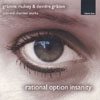Rational Option Insanity
A welcome collection of chamber [piece] pieces from two striking young Irish composers
View record and artist detailsRecord and Artist Details
Composer or Director: Gráinne Mulvey, Deirdre Gribbin
Label: Black Box
Magazine Review Date: 2/2000
Media Format: CD or Download
Media Runtime: 61
Catalogue Number: BBM1015

Tracks:
| Composition | Artist Credit |
|---|---|
| And now the shadows are too long |
Deirdre Gribbin, Composer
Deirdre Gribbin, Composer Jane O'Leary, Piano Paul Roe, Clarinet |
| How to make the water sound |
Deirdre Gribbin, Composer
Alan Smale, Violin David James, Cello Deirdre Gribbin, Composer Jane O'Leary, Piano |
| (The) Sanctity of Trees |
Deirdre Gribbin, Composer
Deirdre Gribbin, Composer Tom Kerstens, Guitar |
| Giles |
Deirdre Gribbin, Composer
Deirdre Gribbin, Composer Madeleine Staunton, Flute |
| Sextet Uno |
Gráinne Mulvey, Composer
Concorde Gráinne Mulvey, Composer Prionnsías O'Duinn, Conductor |
| Rational Optional Insanity |
Gráinne Mulvey, Composer
Alan Smale, Violin Gráinne Mulvey, Composer Jane O'Leary, Piano Lesley Bishop, Horn Paul Roe, Clarinet Prionnsías O'Duinn, Conductor Ruby Ashley, Oboe |
Author: kYlzrO1BaC7A
The profile of Irish contemporary music has been raised considerably in recent years, with Black Box making a valuable contribution. The present disc features two very different composers, both in their early thirties, both writing with style and assurance.
Grainne Mulvey won Irish Radio's Musician of the Future competition for Rational Option Insanity (1993). Despite its brevity, this fast-moving piece has a well-judged momentum, with the variation theme distinctive in its own right. Sextet Uno (1997) is altogether more personal. From an evocative opening of rustling strings and tuned percussion, the music unfolds in organic chains of sound. Intricacy of detail is integrated throughout into the work's rhythmic profile, although the ending rather loses itself in superfluous flurries.
Deirdre Gribbin gained prominence through her operaHey Persephone!, given at the 1998 Almeida Festival and among the few recent stage works with real musical and dramatic instinct. How to make the water sound (1997) opens in the upper reaches of violin and cello, with melodic and rhythmic definition gradually coming into focus. A sequence of hushed piano chords leads into the pensive final section, the viol-like intertwining of strings a poetic recollection of the opening. The sound of water is evoked but never imitated. Equally stiking is Giles (1989), a Watteau-inspired evocation of the commedia dell'arte figure, drawing on associations real and imagined - not least the Pierrot imagery of Schoenberg's song-cycle.
Excellent performances from the members of Concorde, in a cool, natural ambience which suits the crystalline nature of the writing. Well worth investigating.'
Grainne Mulvey won Irish Radio's Musician of the Future competition for Rational Option Insanity (1993). Despite its brevity, this fast-moving piece has a well-judged momentum, with the variation theme distinctive in its own right. Sextet Uno (1997) is altogether more personal. From an evocative opening of rustling strings and tuned percussion, the music unfolds in organic chains of sound. Intricacy of detail is integrated throughout into the work's rhythmic profile, although the ending rather loses itself in superfluous flurries.
Deirdre Gribbin gained prominence through her opera
Excellent performances from the members of Concorde, in a cool, natural ambience which suits the crystalline nature of the writing. Well worth investigating.'
Discover the world's largest classical music catalogue with Presto Music.

Gramophone Digital Club
- Digital Edition
- Digital Archive
- Reviews Database
- Full website access
From £8.75 / month
Subscribe
Gramophone Full Club
- Print Edition
- Digital Edition
- Digital Archive
- Reviews Database
- Full website access
From £11.00 / month
Subscribe
If you are a library, university or other organisation that would be interested in an institutional subscription to Gramophone please click here for further information.




